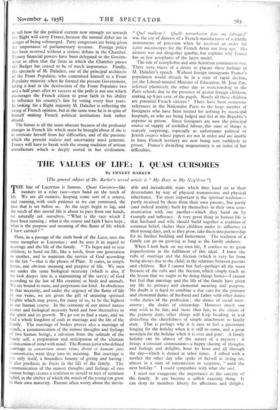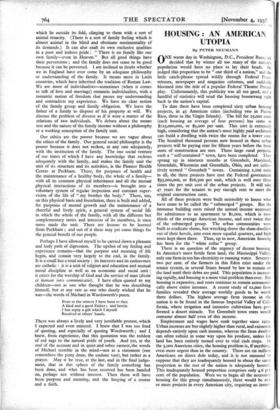THE VALUES OF LIFE : I. QUASI CURSORES
By ERNEST BARKER
[The general subject of Dr: Barker's second article is " My Duty to My Neighbour "] THE line of Lucretius is famous. Quasi Cursores—like runners in a relay race—men hand on the torch of life. We are all runners, keeping some sort of a course, and running, with such patience as we can command, the race that is set before us. As the steps begin to lag, and the torch of this mortal life is about to pass from our hands, we naturally ask ourselves, " What is the race which I have been running ; what is the course and faith I have kept ; what is the purpose and meaning of this flame of life which I have carried ? "
Plato, in a passage of the sixth book of the Laws, uses the same metaphor as Lucretius ; and he uses it in regard to marriage and the life of the family. " To beget and to rear children, to hand on life, like a torch, from one generation to another, and to maintain the service of God according to the law "—that is the phrase of Plato. It states, in simple terms, one obvious meaning and purpose of life. We men are under the same biological necessity (which is also, if we look deeper into it, a maintaining of the service of God according to the law of His creation) as birds and animals. We are bound to mate, and perpetuate our kind. In obedience to that necessity, and under the urgency of the flame of life in our veins, we are given the gift of attaining spiritual }eights which may prove, for many of us, to be the highest in our human course. In the economy of our mixed nature matter and biological necessity bend and bow themselves to the spirit and its growth. We go out to find a mate, and we find a whole kingdom of ends in marriage and the life of the family. The marriage of bodies proves also a marriage of minds, a communication of the inmost thoughts and feelings of two human beings, a salvation from the solitude of the lonely self, a preparation and anticipation of the ultimate Communion of mind with mind. The Roman jurist who defined marriage as consortium omnis vitae, divini et humani juris co►nmunicatio, went deep into its meaning. But marriage is not only itself, a boundless bounty of giving and having : it also produces its fruits in the life of the family. The communication of the inmost thoughts and feelings of two human beings creates a tradition or mould or nest of common belief, in the shelter of which the minds of the young can grow to their own maturity. Parents often worry about the inevit- able and ineradicable traits which they hand on to their descendants by way of physical transmission and physical inheritance. Far more important is the spiritual tradition— partly received by them from their own parents, but partly (and indeed mainly) built by themselves in their own com- munication with one another—which they hand on by example and influence. A very great thing in human life is that husband and wife should build together a tradition of common belief, shelter their children under its influence in their young days, and, as they grow, take them into partnership for its further building and betterment. The tradition of a family can go on growing as long as the 'family endures.
When I look back on my own life, I confess to its great imperfections in the fulfilment of this ideal. I know the rubs of marriage and the friction (which is very far from being always due to the child) in the relations between parents and children. But I cannot but feel—perhaps all the more because of the rubs and the friction, which simply teach us the lesson that we ought to be doing things better—I cannot but feel that marriage and the life of the family have given my life its primary and elemental meaning and purpose. No doubt it is hard to combine a due care for the primary and elemental duties of husband and father with other duties —the duties of the profession ; the duties of social inter- course ; the duties of citizenship. However much one may wish to be fair, and more than fair, to the claims of the primary duty, other things will keep breaking in a id disturbing the cheerfulness of simple attachment to family duty. That is perhaps why it is easy to feel a passionate longing for the holiday when it is still to come, and a great nostalgia for the holiday when it is over and gone. A family holiday can be almost of the nature of a mystery : it brings a constant communion—a happy sharing of thoughts and feelings and delights, hour by hour and all through the day—which is denied at other times. I talked with a mother the other day who spoke of herself as living on, almost in a state of intermission or suspense, " until the next holiday." I could sympathise with what she said.
I must not exaggerate the importance or the sanctity of the family. It can become a selfish exacting thing. It can deny its members liberty for affections and delights which lie outside its fold, clinging to them with a sort of animal tenacity. (There is a sort of family feeling which is almost animal in the blind and obstinate sentimentality of its demands.) It can also exalt its own exclusive qualities in a poor and jealous pride : " There is no family like our own family—even in Heaven." But all good things have their perversions ; and the family does not cease to be good because it can be perverted. I am inclined to doubt whether we in England have ever come by an adequate philosophy or understanding of the family. It means more in Latin countries, which have inherited the tradition of Roman Law. We are more of individualists—sometimes (when it comes to talk of love and marriage) romantic individualists, with a romantic notion of freedom that passes my understanding and contradicts my experience. We have no clear notion of the family group and family obligation. We leave the father of a family to dispose of his property at will. We discuss the problem of divorce as if it were a matter of the relations of two individuals. We debate about the means test and the nature of the family income without a philosophy or a working conception of the family unit.
Our ethics are the poorer because we are vague about the ethics of the family. Our general social philosophy is the poorer because it does not reckon, at any rate adequately, with the institution of the family. The one social venture of our times of which I have any knowledge that reckons adequately with the family, and makes the family unit the unit of its structure and its activities, is the Pioneer Health Centre at Peckham. There, for purposes of health and the maintenance of a healthy body, the whole of a family— with all its common physical inheritance and all the mutual physical interactions of its members—is brought into a voluntary system of regular inspection and constant super- vision of the life of " my brother the body." There, too, on this physical basis and foundation, there is built and added, for purposes of mental growth and the maintenance of a cheerful and lively spirit, a general system of social life in which the whole of the family, with all the different but complementary tastes and interests of its members, is once more made the unit. There are lessons to be learned from Peckham ; and out of it there may yet come things for the general benefit of our people.
Perhaps I have allowed myself to be carried down a pleasant and leafy path of digression. The upshot of my feeling and experience remains—that the purpose and meaning of life begin, and remain very largely to the end, in the family. It is a small but a total society : its interests and its endeavours are catholic : it is a unit of religion and education and mutual moral discipline as well as an economic and social unit it exists for the worship of God and the service of man (divini et humani juris communicatio). I have often quoted to my children—not as one who thought that he was describing ,himself, but at any rate as one who dearly wished that he was—the words of Michael in Wordsworth's poem.
Even to the utmost I have been to thee A kind and a good Father ; and herein I but repay a gift which I myself Received at others' hands.
There was always a lively and very justifiable protest, which I expected and even enjoyed. I knew that I was too fond of quoting, and especially of quoting Wordsworth ; and I knew, from experience, that this quotation was the reddest of red rags to the natural pride of youth. And yet, at the end of the account and in quiet and sober earnest, the words of Michael tremble in the mind—not as a statement (one remembers the petty done, the undone vast), but rather as a prayer. May it be true, at the last, and in the final judge- ment, that in this sphere of the family something has been done, and what has been received has been handed on, perhaps not without interest. Then there will have been purpose and meaning, and the keeping of a course and a faith.











































 Previous page
Previous page